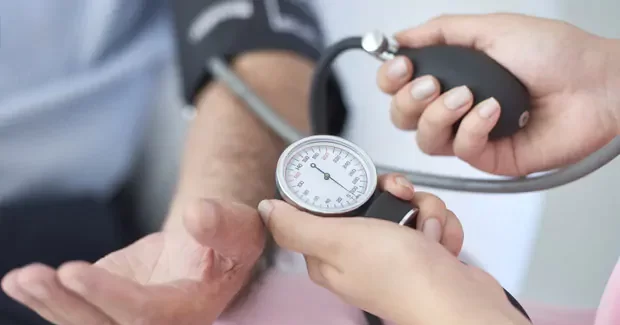High blood pressure, often known as hypertension, is commonly associated with older age people. However, new research has shown an alarming incidence among young adults in their twenties and thirties. Dr. Sunil S Bohra, Senior Consultant – Internal Medicine Apollo Hospital, Seshadripuram, Bengaluru, explains that hypertension can silently harm the heart, brain, and kidneys, earning it the nickname “silent killer”. According to a recent ICMR study published in 2024, more than 20% of persons under the age of 40 have high blood pressure as a result of a variety of conditions, including stress, a lack of physical activity, and sleep deprivation.
According to the Apollo Health of Nation Report for 2025, while almost three-fourths of hypertension cases are associated with fatty liver disease, over 9% of high school kids and 19% of college students are already at danger. Constant use of digital devices, including but not limited to smartphones and laptops, heightens these risks by raising stress levels and interrupting sleep cycles. Fortunately, young adults can simply take some basic precautions to monitor and even avoid high blood pressure, allowing them to maintain excellent health for the long term. Here are five simple ways to do so.
1. Monitor Blood Pressure Regularly
Young adults are likely to miss regular health screenings, believing that they are not yet susceptible to serious conditions. However, high blood pressure can develop in adolescence and particularly in those with a family history of hypertension. Generally, it should be measured at least once a year if readings are normal; that is, below 120/80 mmHg. More frequent measurements will be required if the readings are mildly elevated (120-129/<80 mmHg) or hypertensive (130/80 mmHg or above). These days, home blood pressure monitors are quite affordable and easy to use. For accurate results, relax beforehand; don’t have coffee or tea just prior, and measure at the same time each morning, preferably. Maintaining such a record will help detect variations early on so that preventive measures may be taken against complications like heart disease, stroke, or kidney failure later on.
2. Eat a Healthy, Balanced Diet
Daily food intake is another important determinant of blood pressure. A long-term consumption pattern of salty snacks, sugar-laden beverages, and fast foods is likely to increase BP. A healthier approach involves diets such as DASH that provide abundant fruits, vegetables, and whole grains (e.g., oats or brown rice); lean proteins such as chicken; and low-fat dairy products like milk and yoghurt. It is advised to consume salt in a diet limited to one teaspoon per day, equivalent to 2,300 mg, or even lesser, 1,500 mg, if the person is at higher risk. Avoid packaged snacks like chips and ready-to-eat meals; these often contain hidden sodium and sugar. Such Foods are very good for added potassium content. This dietary approach will not only help in controlling blood pressure but also minimise the chances of weight gain associated with diabetes.
3. Stay Active Every Day
Physical activity ensures that the heart remains healthy and the blood vessels function properly. Try to do 150 minutes of moderate activities each week, like brisk walking, cycling, or swimming. It is also beneficial to include strength training exercises, such as weight lifting or push-ups, twice a week. Even small efforts count, such as a 10-minute walk after eating. Regular physical activity can reduce blood pressure by 5 to 8 mmHg, which is quite relevant to the benefits it provides to heart health while simultaneously helping offset the adverse effects of prolonged sitting—often associated with using digital devices.
4. Handle Stress in Healthy Ways
Stress from work, studies, or constant smartphone usage may cause temporary elevation of blood pressure along with behaviour patterns such as overeating or smoking. One can maintain equilibrium through simple exercises like deep breathing, meditation, or yoga for a few minutes daily. It is essential to have 7-9 hours of sleep each night; avoiding screens before going to bed helps since the light emitted by devices interferes with sleep. It is also important to engage in leisurely activities such as reading or socialising with friends and not getting overwhelmed by work or social media connectivity. These activities help in reducing spikes in blood pressure due to stress and enhance general well-being, especially in an always-connected world.
5. Avoid Harmful Substances and Habits
Some activities are harmful to the heart and also increase blood pressure. For example, smoking harms the blood vessels regardless of how occasional it is; thus, it should be completely avoided. Alcohol intake should not exceed two drinks per day for men and one for women. Recreational drugs such as cocaine and unregulated diet pills that can cause severe spikes in blood pressure must be avoided. To facilitate sleep, remove devices from the bedroom so there is no scrolling late at night. Avoiding these habits protects not only blood pressure but also the heart, lungs, and brain.
Preventing hypertension in young adults requires a series of small, cumulative choices. Regular blood pressure monitoring with a home device, consumption of healthy dietary options, physical activity, stress management, and avoidance of dangerous substances all help the young adult build a strong foundation for heart health.
The measures also address contemporary issues, such as excessive use of digital gadgets, which causes increased stress and, as a result, decreased sleep quality. If you have a family history of high blood pressure, diabetes, or obesity, you should see your doctor for personalized guidance. These habits, if developed at this point, would lead to a better and longer life.
Disclaimer: (The tips and suggestions in this post are intended for general information only and should not be considered professional medical advice. Always with your doctor or a dietician before beginning any exercise program or making any dietary adjustments.)
Source: In Tv







 Finance
Finance







